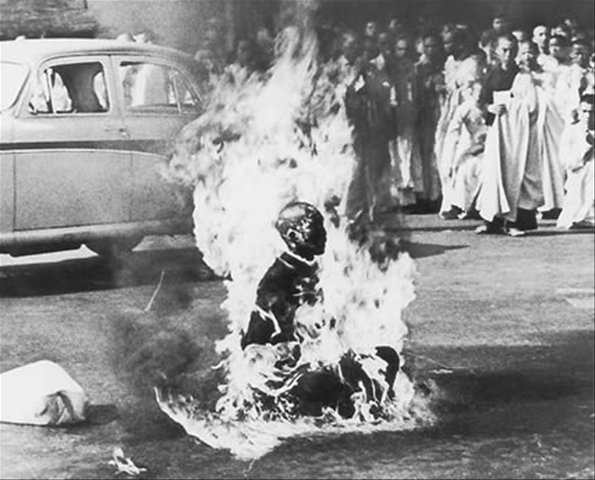
I first saw this image when I was a kid, in an old issue of Life Magazine. I asked my father to explain to me why this monk had set himself on fire and could sit there so calmly as he burned to death -- in what must have been extreme pain. He had no good answer, and whatever answer he did offer was presented through the lens of his Roman-Catholic beliefs.
Over the years I have seen the image again and again, but I had never encountered a good explanation of what motivated the monk, until the other night. Most explanations I have seen are framed in politics, the desire to end the war -- which is certainly a part of it. But Lama Surya Das offers a slightly different take on it, one that feels right to me.
Quang Duc's final act -- which in succeeding months and years inspired a handful of other Buddhist monks and nuns to also immolate themselves -- represents a practice of supreme generosity that has its roots in the Lotus Sutra, one of the most significant scriptures of Mahayana Buddhism. Because these Vietnamese monks and nuns realized their ultimate, unborn, deathless nature and were no longer attached to an idea of the physical body as the self, they were free to use their bodies to deliver a powerful wake-up message to others. You could say they transformed their bodies into torches to illuminate the terrible suffering of the Vietnamese people. Only those Bodhisattvas who have truly liberated themselves by seeing deeply into the profound prajna truth of the universe can undertake this ultimate gesture of generosity with complete clarity and wisdom and without doubt or negative karmic repercussions. Contemporary master Thich Nhat Hanh, who knew Quang Duc personally, remarked on Quang Duc's act, "It was not made out of despair, but out of the wish to help, out of his great love for humankind." It has taken me years to understand this statement, but it has been worth the journey.
~ Buddha Is as Buddha Does
This is an inspiring level of generosity. Few of us, if any, will ever know that level of pure love and intention to help others. But that doesn't mean we can't aspire to be the most kind and generous people we can be.
Generosity is such a simple act -- all we need to do is consider the happiness and well-being of others. We don't have to sacrifice our own happiness, although sometimes we might trade our personal attachments for freedom from them in order to assist others. Seems like a good deal.
In fact, selfless generosity makes us happy -- it feels good. More importantly, however, it makes other people feel good, feel cared for, and that can make them more likely to do something generous for another person.
With each generous act we can initiate a chain reaction of kindness.
Tags:
1 comment:
Bill,
that explanation of Lama Surya Das is very touching. and it could very well be the more "correct" explanation, at least from a Buddhist point of view.
however, allow me to disagree... aren't we justifying this action with our own bias with the Buddhist worldview?
according to Lama Surya Das this immolation "represents a practice of supreme generosity that has its roots in the Lotus Sutra, one of the most significant scriptures of Mahayana Buddhism. Because these Vietnamese monks and nuns realized their ultimate, unborn, deathless nature and were no longer attached to an idea of the physical body as the self, they were free to use their bodies to deliver a powerful wake-up message to others."
while it is a more compassionate explanation than say, martyrdom for the sake of hooking up with virgins in the afterlife, i feel that there is a BIG assumption and leap of faith in this argument. the biggest assumption is that the monks have "realized their ultimate, unborn, deathless nature and were no longer attached to an idea of the physical body." let's assume for a moment that this is true. then how come buddhas and dalai lamas, and other "enlightened" buddhist monks and practitioners do not engage in self-immolation?
according to this Wikipedia entry: "Several Buddhist monks followed Thich Quang Duc's example and burned themselves to death.... The self-immolation is widely seen as the turning point of the Vietnamese Buddhist crisis which led to the change in regime."
although this act of self-immolation is considered to be a turning point for the regime change in Vietnam, it is my opinion that this self-immolation is not the most enlightened (or optimum strategy). having seen the power of a bloodless revolution (e.g. in my own country, see EDSA revolution), i can say with confidence that there are more sophisticated ways of protests than burning oneself to attract attention.
and while this act of supreme generosity triggered the change in Vietnamese regime, i doubt that The Dalai Lama would perform the same act of "supreme generosity" as a protest for his beloved Tibet.
in the end, we can only second guess Thich Quan Duc's intention and state of mind when he performed that courageous act of self-immolation/supreme generosity. however, from my own limited perspective, i think we should be aware of our own bias with the Buddhist worldview.
take note that Christ's death on the cross is interpreted by Christians as an act of supreme "love" of Christ as well as supreme love of God (read: for God so loved the world that he gave his only begotten son...). however, some Buddhists and mystics interpret Christ's death as a premature death imposed on him by people who didn't understand his mystical teachings. that Christ could've lived a long life like the Buddha, touching other people's lives with his mystical teachings rather being idolized and used by adherents as a scapegoat for the afterlife.
my two cents ;)
~C
P.S. but that intact heart is still fascinating! :)
Post a Comment